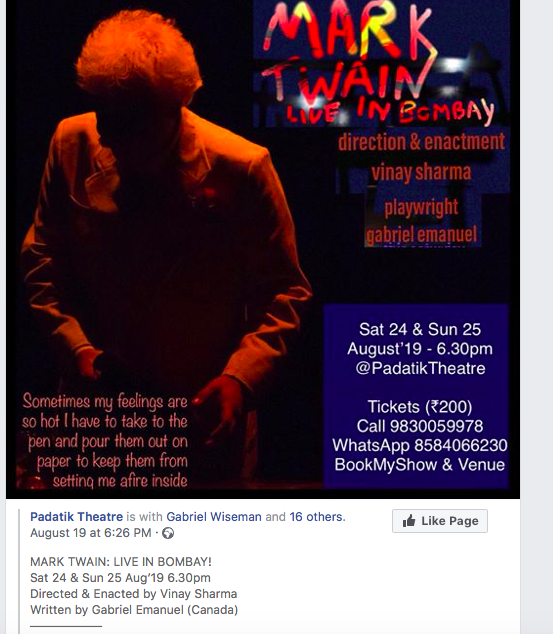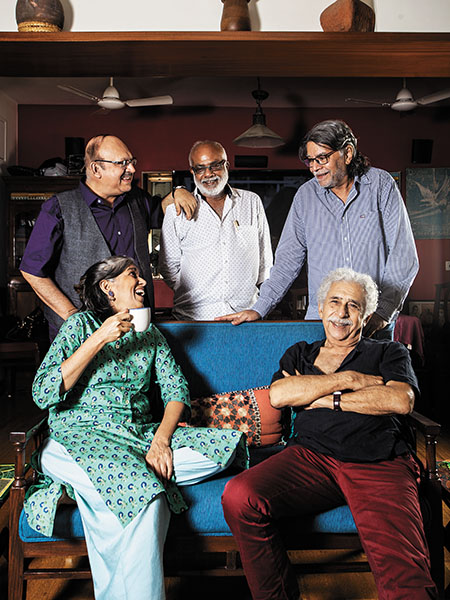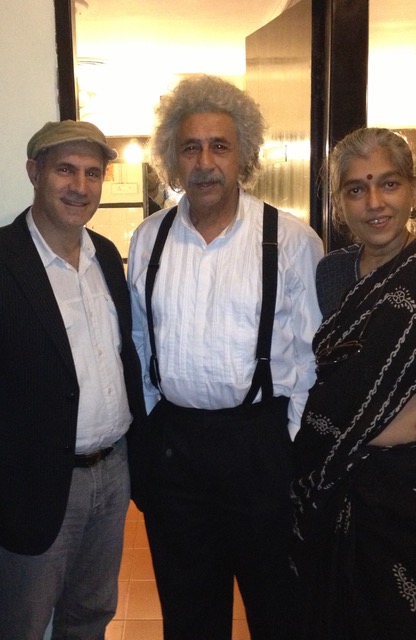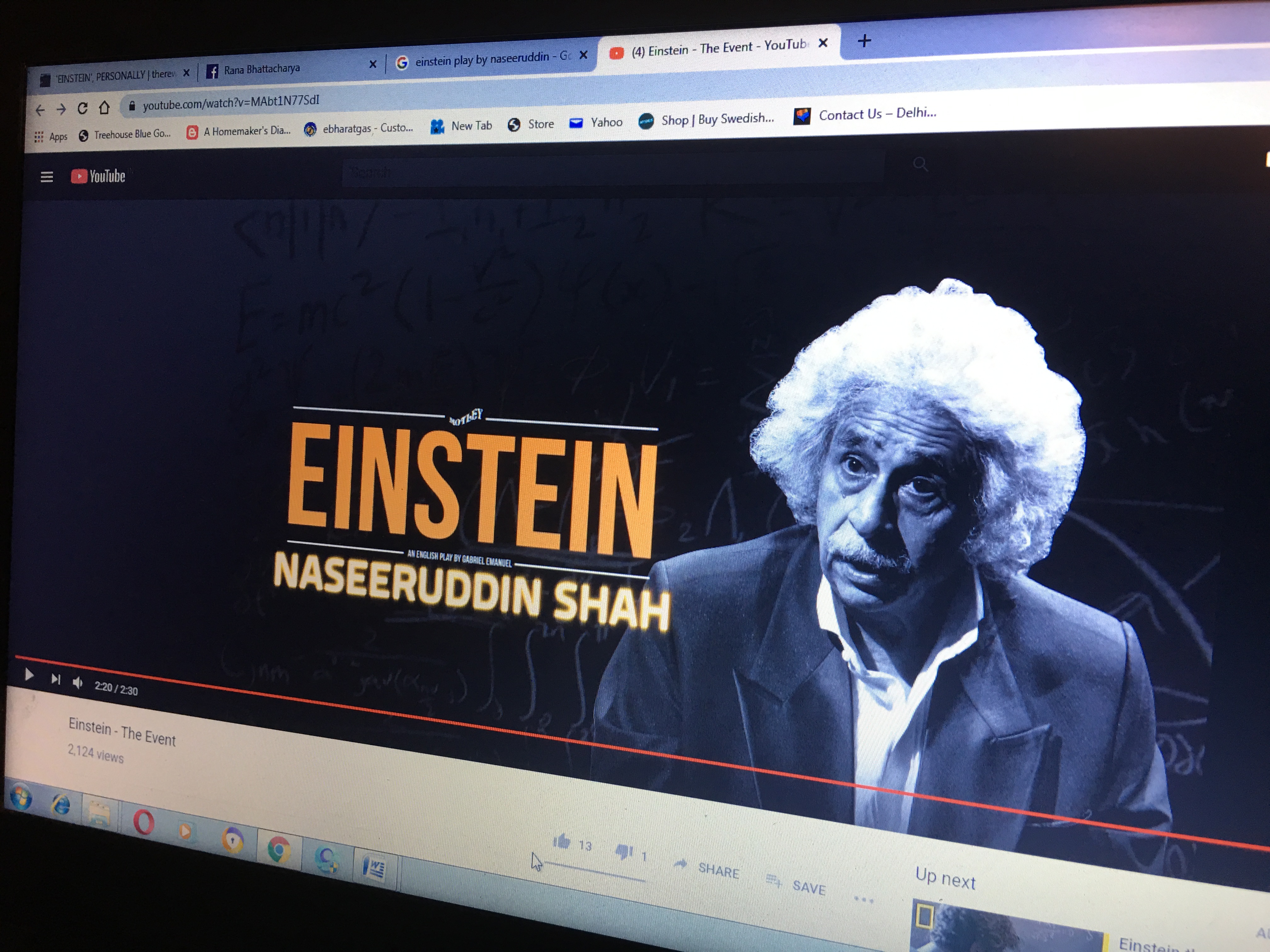I always thought Naseeruddin Shah looks like my father; it’s just that he looks about 10 years younger, which is understandable, as he happens to be ten years younger. I have never seen Naseer sahab in person. So when I heard his play ‘Einstein’ is coming to Delhi NCR for the first time – I booked the tickets, just to see him first-hand, even if only from the last row of a deep auditorium.
It was when I started reading about the play, slowly but surely my curiosity about the character and the content of the play started overriding my initial fan-boy mindset.
Strangely, a play that was written 35 years back in Canada, by a Jewish playwright for a Jewish Theatre company, and about a scientist who died about two decades before I was born – started feeling very personal.
Why does a writer write what he writes? How does it become personal to its reader, in a different space and time? Snooping around a little bit on the subject and its choice further perplexed me; but I gathered my wits and decided to post a mail to the writer of the play, Gabriel Emanuel.
It’s been a tough week and it’s still not ended. I will come straight to the letter.
Namaste
I was particularly confused whether I should at all be writing this letter to you.
I mean, when I have a question about a literary work, I don’t usually pick up a keyboard and shoot mails to its creator. Being a habitual researcher, I try to find the answers myself – from the net, from libraries, from other works of the same person etc. But ever since I bought the tickets for Einstein, which was about couple of weeks back, one single question has been nagging me – and I can’t seem to find an answer.
How personal is Einstein as a play to its writer Gabriel Emanuel?
For me, it’s personal. Let me explain.
You must be aware of the circumstances the lead actor of the play had been facing. It wasn’t long back when he was dubbed an anti-national for his liberal views. Our country is changing from the inside. Ridiculous jingoistic nationalism; lynching of minorities by mobs; killing of rationalists for expressing their counter-views; stupendous hate-waves over social media, with trolls running amok that understand neither rhyme nor reason nor science; even food-delivery being declined because the delivery boy is from another religion…
I won’t bore you with the details; like Einstein said, it’s tough to define relativity in one sentence. Let me rather quote a few lines from one of your poems.
“You live by the sword
Your hand on every man
Attacking from the rear
The only way you can
You educate your children
To die on your command
For a world that you desire
Where every freedom’s banned…”
Yes, Einstein is personal to us in our age and time; because the mob always tramples over intelligence; because the father of relativity may not have believed in armies and borders, but others did; they still do.
Let me keep this short; I don’t even know if you are on the other side of this mail-id; and if you are, then whether you will at all be inclined to respond to a question about something that you wrote about 35 years back; gosh, in 84, I was merely 12 years old.
I tried. I went to your website (which is quite objective and useful – it’s just that it’s not in first person). I tried searching for your interviews on the play. I bought your book of poems, and went through it, hunting for signs. I read your poem on the ‘Brain of Einstein’ (that you must have written around the same time you wrote the play), I read the ‘Jew’s Chant’ and the ‘Last Poem in the World’, and ‘They Told Stories about You’ and everything else on that collection multiple times. I got even more confused.
Don’t misunderstand me. That lovely collection has poems written over 40 years – and it does give a fair idea about the expansive nature of your personality, but it doesn’t answer my question – How personal is Einstein to its writer?
The play was still far off. I couldn’t wait and decided to spend some Canadian dollars. Bought a pdf download of ‘Einstein’ from the Canadian Playwright’s Guild and read the play cover to cover. Three times till today morning; it’s a lovely play, quite balanced – but since you wrote it, you probably already know that. I am yet to read ‘Children of Night’, which is in the same collection. I did spot, however, that you dedicated the collection to your parents. That might mean something; or nothing.
The play does have some key takeaways for me; my ‘personal’ sections are the places where the protagonist is talking about the ‘madness’ of war and the ‘epic lunacy’ of extreme right-wing bigotry; where he quips on his being the ‘enemy of the people’; where he gives an explanation of why he signed the atom bomb ‘letter’; where he reveals how he was hounded and threatened and sidelined in a country that once venerated him. That’s where I feel, I know this guy. I know what his problem is; it’s my problem too.
But I still don’t know how personal is Einstein the play to its creator Gabriel Emanuel.
Perhaps I’ll never get to know the genesis story of the play; even if you don’t have an ‘Elsa’ like Einstein to screen your e-mails and have actually come this far reading this, you might not consider responding to such ‘personal’ questions.
But if I don’t ask questions, I can’t expect answers.
Next weekend, I go watch the play. It’s about me. Thanks for writing it.
Anirban
Within a day, much to my surprised pleasure, Gabriel responded.
He has kindly allowed me to publish his response.
Dear Anirban,
Thank you for your thoughtful letter.
Indeed, I only learned from you that “Einstein” would be presented this weekend as I actually have another play being presented in Kolkata this weekend (“Mark Twain Live in Bombay” at Padatik Theatre) and I thought that perhaps you were mistaken but it turns out that I was simply unaware.
Regarding the genesis of the play, I can tell you that I wrote it while I was in my 3rd year of law studies in Canada (yes, sorry to disappoint you but I am also a lawyer). The final year of law studies is also a particularly boring year. I woke up one day and stared at the poster on my wall which was a photograph of Einstein. It dawned on me that while I was about to embark on a legal career, I knew absolutely nothing about science, let alone physics. I thought, why not start at the top, with Einstein?
My next stop was at the University Library where not surprisingly, books on pure physics proved to beyond my intellectual reach. Next, I turned to some biographies on Einstein and was rather quickly captivated by the intense drama of Einstein’s life which reflected major events of the 20th century such as the Second World War, the Holocaust and the development of the Atomic bomb.
The fact that I am also a Jew, as Einstein was, surely added the personal dimension to the story which you inquire about. Although he was by no means religious, Einstein directly experienced anti-semitism and this had a profound effect upon him as you will have read in the play.
Incidentally, Naseeruddin Shah’s portrayal of Einstein is one of the finest acting performances that I was privileged to see, ever! You are certainly in for a treat! And if you should find yourself in Kolkata, I believe you would also greatly enjoy the performance of another excellent actor, Vinay Sharma.
Below is an ad for that show.

Finally, as you are keen to know about the personal connection, Einstein became identified with the Zionist movement for establishing a Jewish homeland in Israel. While he was never a nationalist and was indeed himself the victim of nationalism, he came to realize that after the Nazis killed six million Jews, it was necessary for the Jewish people to have a safe refuge in the world. He believed that establishing the refuge in the ancestral home of Israel was an imperative that could no longer be ignored after such a tragedy of unfathomable proportions.
While I was born in Canada, a wonderful peace loving country, I chose to live in Israel where a new chapter of the Jewish people is currently being written.
I hope I may have answered, at least in part, some of your questions.
Best regards,
Gabriel
Yes Gabriel, it does respond to my question, mostly.
Naseer, in many of his interviews, has mentioned how he picked the play for performance. I chose one of them – he has been quite consistent in his response to this question.
This one is from a Times of India interview, dated October 31, 2014 – around the time of the Prithvi Theatre festival, where it was premiered.
Naseer sahab, why Einstein?
Why not Einstein? Mostly because I look like him. Somebody once mailed me a drawing he had made of me looking just like Einstein, which is when it struck me how much I looked like him. I do have Jewish features actually and get mistaken for a Jew when I have a beard. But jokes aside, I have always decided to do a play I came across if I liked it after the first reading. I have had this script lying in my drawer for over 10 years and in fact, don’t even remember who gave it to me, except that it was someone in Delhi, but I had decided that I would do it one day. This time, for the Prithvi Theatre festival, I was a little bit stuck with ideas and was planning to do an Ismat Apa Ke Naam Part 3, but it wasn’t quite falling in place, so I decided to abandon it. Kunal (Kapoor) was insistent that I do something for the festival and it is a matter of pride to be part of the festival anyways. I had two months to practice a new play and I decided to do Einstein.
If you want to read the whole interview, here is the LINK.
So that’s that; it was pure coincidence. Good to know.
I too have a beard, curly hair, and a non-Grecian nose; my children don’t have much of a religious training either; and, come to think of it, my father has a striking resemblance to Einstein – it’s just that the former looks about ten years older.
I found this nice trailer of the play on you-tube; so all ye unlucky souls who didn’t buy the tickets for the play, please watch, and be happy for me.
I now know why ‘Einstein’ feels personal; because it’s about us.
I also read this wonderful forbesindia.com article about Motley, the two-man endeavor of Naseeruddin Shah and Benjamin Gilani that has become a behemoth of Indian theatre now – with 42 plays in 40 years.

Picture courtesy: www.forbesindia.com
You can click on the image to go to the original article.
And yes, Gabriel, I will take the first opportunity I have to watch Vinay Sharma’s portrayal of Mark Twain. Have always loved Mark Twain for his perceptive wit.
Among many others, one quote particularly appeals to me – “Politicians and diapers must be changed often, and for the same reason.”
I do hope that quote is there in the Indian version.



Be First to Comment